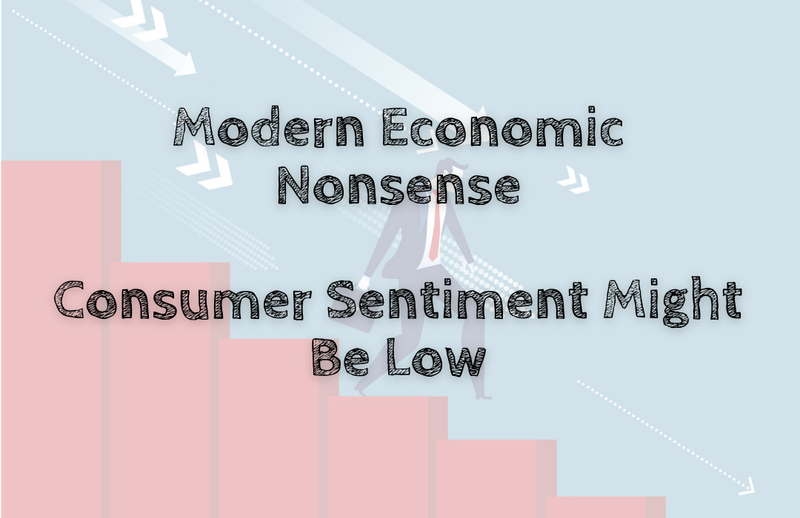
It’s no secret that the U.S. consumer is feeling a bit pessimistic about the economy at the moment. In fact, today’s climate of uncertainty has led to a general distrust among consumers and left many hesitant to spend money on anything not absolutely necessary. With this in mind, it’s important for businesses to be aware of any potential red flags that could signal a decrease in consumer sentiment. The more you know about your target audience, the better you can understand why they may have negative feelings about your company or its products. Here are some insights from U.S. consumers as to why their sentiment might be low and how you can improve your marketing strategy accordingly:
People feel they have less control over their lives
Some experts have even dubbed 2019 the “Year of Feeling Lost,” as many people feel as though they have no control over their future. Consumer sentiment is influenced by more than the economy — it’s also influenced by the mood of the world. It’s important to keep this in mind when assessing the state of your business, especially if you’re marketing to an international audience. It’s easy to think that the way your company functions internally doesn’t have any bearing on consumer sentiment. While this is true to an extent, it’s also important not to ignore the fact that your customers are affected by the state of the world. People tend to be more cautious about their spending when times are uncertain — and that can lead to a decrease in consumer sentiment. The best way to combat this issue is to be transparent about the current state of your company. Consumers appreciate honesty and tend to trust brands that are straightforward. Transparency allows you to address any concerns customers may have and reassure them that the future is looking bright.
Consumers are unhappy with their current job opportunities
U.S. consumers are also feeling frustrated by the job market. At the end of 2018, only 37% of Americans were confident that they’d find a job in their chosen field. This lack of confidence has led many people to believe that the job market is highly competitive and not worth trying. This frustration can have a significant impact on consumer sentiment. If people don’t feel confident that they’ll be able to find gainful employment, they’ll likely be less willing to spend money. If, on the other hand, you’re in the job-hunting industry, this insight can help you develop a winning strategy for finding the right candidates.
Brands are failing to meet basic expectations
Another reason consumer sentiment may be low is that brands are struggling to meet consumer expectations. For example, many customers have high standards when it comes to the quality of the products they buy — but not all brands are able to meet these standards. This is especially true when it comes to food and beverage companies. Consumers have become more health-conscious in recent years, and many have come to expect certain things from their favorite brands. If you’re in the food and beverage industry, it’s crucial to stay up to date on what your customers want.
Consumers feel overwhelmed by all the information out there
Today’s world has become increasingly saturated with information — and it’s become difficult for consumers to filter through all the noise. As a result, many people have grown to distrust certain brands, as they worry that companies are failing to be transparent. This is especially true for digital marketing campaigns. Consumers are more likely than ever to turn off ads of any kind, as they simply don’t have the time or energy to sit and process everything they see. If your company depends on digital marketing, it’s important to understand that people are feeling overwhelmed by the sheer amount of information they’re being exposed to.
Cryptocurrency can boost sentiment
Cryptocurrency has no branding image and no corporations to promote such cryptocurrencies. Only people who voluntarily believe that cryptocurrency can be a better currency than the fiat currency. The concept of crypto is beyond branding but promotes decentralization, fairnes,s and transparency.
Conclusion
Consumer sentiment is influenced by more than just the economy. While it’s true that the global economy often has a significant effect on consumer sentiment, it’s important to remember that people also make purchasing decisions based on more than just the financial implications. For example, if people feel as though they can’t trust your company, they’ll likely be hesitant to purchase any of your products or services. On the other hand, if people feel as though your brand is transparent and trustworthy, they’ll be more likely to purchase from you. At the end of the day, it’s important to remember that consumers are people — and people are diverse. No two people will have exactly the same reasons for feeling optimistic or pessimistic about the economy. By keeping this in mind, you can better understand your target audience and tailor your marketing strategy to meet their needs and improve their sentiment. And cryptocurrency can definitely boost the confidence of the current low sentiment market condition.
Comments